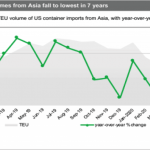New U.S. Rule Changes on Exporting to China, Venezuela, and Russia
 The United States Bureau of Industry and Security (BIS) issued rule changes to two sets of export laws and a proposal to change a third. The changes that are now final rules will go into effect on June 29th, 2020. The proposal is open for public comment until that same date.
The United States Bureau of Industry and Security (BIS) issued rule changes to two sets of export laws and a proposal to change a third. The changes that are now final rules will go into effect on June 29th, 2020. The proposal is open for public comment until that same date.
The rule changes getting the most attention are the ones expanding the licensing requirements on exports to China, Russia, or Venezuela that could be used to support those countries’ militaries. Not surprising, most of the coverage of this rule change focuses on China. China is, of course, the biggest trade partner and the United States’ current trade relations with China is interesting to say the least. We’ve gone from trade war to signing a trade deal to trade relation deterioration amidst the novel coronavirus pandemic that originated in Wuhan. But beyond that, the lines between civilian businesses and the government in China are very blurry.
The U.S. government wants better visibility of what is getting shipped to China, Russia, and Venezuela that could be used for military purposes and the ability to better limit U.S. exporters from supplying those countries with materials or goods that in a way of looking at it, though the goods are paid for, could be considered military aid. Therefore, the U.S. is expanding controls on the exporting of goods that are for “military end use” or for “military end users.”
Here’s the BIS published listing of the new rule and its summary from the Federal Register:
Expansion of Export, Reexport, and Transfer (in-Country) Controls for Military End Use or Military End Users in the People’s Republic of China, Russia, or Venezuela
Final rule, effective June 29, 2020
In this final rule, The Bureau of Industry and Security (BIS) is amending the Export Administration Regulations (EAR) to expand license requirements on exports, reexports, and transfers (in-country) of items intended for military end use or military end users in the People’s Republic of China (China), Russia, or Venezuela. Specifically, this rule expands the licensing requirements for China to include ‘‘military end users,’’ in addition to ‘‘military end use.’’ It broadens the list of items for which the licensing requirements and review policy apply and expands the definition of ‘‘military end use.’’
Next, it creates a new reason for control and the associated review policy for regional stability for certain items exported to China, Russia, or Venezuela, moving existing text related to this policy. Finally, it adds Electronic Export Information filing requirements in the Automated Export System for exports to China, Russia, and Venezuela.
Normal 0 false false false EN-US X-NONE X-NONESUMMARY: The Bureau of Industry and Security (BIS) is amending the Export Administration Regulations (EAR) to expand license requirements on exports, reexports, and transfers (in-country) of items intended for military end use or military end users in the People’s Republic of China (China), Russia, or Venezuela. Specifically, this rule expands the licensing requirements for China to include ‘‘military end users,’’ in addition to ‘‘military end use.’’ It broadens the list of items for which the licensing requirements and review policy apply and expands the definition of ‘‘military end use.’’ Next, it creates a new reason for control and the associated review policy for regional stability for certain items exported to China, Russia, or Venezuela, moving existing text related to this policy. Finally, it adds Electronic Export Information filing requirements in the Automated Export System for exports to China, Russia, and Venezuela. This rule supports the objectives discussed in the National Security Strategy of the United States.
What Exactly Are Military End Users and Military End Use?
The natural question that pops up from this rule change is, “What are ‘military end users’ and ‘military end use’?”
If we’re talking China, obviously the People’s Liberation Army (PLA), and any of its branches, would be a military end user and using items to house or arm PLA soldiers would logically be classified military end use. However, military end user and end use is much broader in its scope than the obvious, at least according to a trade lawyer Karen Freifeld quoted in a Reuters article about these rule changes:
Washington trade lawyer Kevin Wolf said the rule changes for China are in response to its policy of military-civil fusion: finding military applications for civilian items.
He said the regulatory definitions of military use and user are broad and go beyond purchases by entities such as the People’s Liberation Army.
For example, Wolf said, if a car company in China repairs a military vehicle, that car company may now be a military end user, even if the item being exported is for another part of the business.
“A military end user is not limited to military organizations,” Wolf said. “A military end user is also a civilian company whose actions are intended to support the operation of a military item.”
I defer to Wolf’s superior knowledge on the subject of law; however, from reading the published law, it does not appear that the definition of military end user has expanded, but military end use certainly has. Here’s an excerpt on the definitions from the Federal Registrar:
The EAR’s current definition of military end users includes the army, navy, air force, marines and coast guard, plus the national guard/police, government intelligence and reconnaissance organizations; this rule does not modify that definition. The EAR’s current definition of military end use refers both to direct use (for parts, components or subsystems of weapons and other defense articles) and indirect use (weapon design and development, testing, repair and maintenance). This rule broadens the definition of military end use beyond any item for the ‘‘use,’’ ‘‘development,’’ or ‘‘production’’ to include any item that supports or contributes to the operation, installation, maintenance, repair, overhaul, refurbishing, ‘‘development,’’ or ‘‘production,’’ of military items.
The law change absolutely does seem aimed at looking closer at end users that are not military organizations as I think Wolfe is actually saying, even though the definition of military end users itself does not change with the law update. In fact, the printed regulation actually states:
This expansion will require increased diligence with respect to the evaluation of end users in China, particularly in view of China’s widespread civil-military integration.
For an example of the kind of effect this rule change may have, Freifeld wrote in her article that this could specifically “hurt the semiconductor industry and sales of civil aviation parts and components to China.”
Getting Rid of Exceptions
There are goods and technologies that are controlled for national security reasons, requiring licenses for exporting them to countries on the BIS D:1 (National Security) list, which includes China, Russia, and Venezuela among many more nations. There were items among the goods and technologies controlled for national security that had exceptions so long as they were being exported to civil end users and not for military, terrorist, or other prohibited end uses. All exemptions to needing a license for such goods and technologies are being removed.
A JD Supra published article gives the following examples of items that enjoyed exeption:
Examples of the many items currently eligible for the license exception include certain human and animal pathogens, advanced anti-friction bearings, semiconductors and semiconductor design and production technology, telecommunications equipment, optics and radar technology, civil aircraft parts and components, and other aerospace technology.
Here’s the BIS published listing of this new rule change and its summary from the Federal Register:
Elimination of License Exception Civil End Users (CIV)
Final Rule, effective June 29, 2020In this final rule, the Bureau of Industry and Security (BIS) is amending the Export Administration Regulations (EAR) by removing License Exception Civil End Users (CIV) and requiring a license for national security controlled items on the Commerce Control List (CCL) to countries of national security concern. This will advance U.S. national security interests by allowing U.S. government review of these transactions to these countries prior to export, reexport or transfer (in-country) in accordance with current licensing policy for national security controlled items on the CCL. This rule also makes conforming changes to the CCL by removing the CIV paragraph from each Export Control Classification Number on the CCL where it appears.
SUMMARY: In this final rule, the Bureau of Industry and Security (BIS) is amending the Export Administration Regulations (EAR) by removing License Exception Civil End Users (CIV) and requiring a license for national security- controlled items on the Commerce Control List (CCL) to countries of national security concern. This will advance U.S. national security interests by allowing U.S. government review of these transactions to these countries prior to export, reexport or transfer (in- country) in accordance with current licensing policy for national security- controlled items on the CCL. This rule also makes conforming changes to the CCL by removing the CIV paragraph from each Export Control Classification Number on the CCL where it appears.
You Can Still Weigh-In on Proposed Reexport Rule Change
A similar tightening of export rules is proposed that exporters could still weigh in on. This one would remove license exceptions on the reexport of items on the Commerce Control List.
You can read the full proposal by clicking here.
Of course, I’ll also include the BIS published listing of the new rule proposal and its summary from the Federal Register:
Modification of License Exception Additional Permissive Reexports (APR); Proposed rule
The Bureau of Industry and Security (BIS) proposes to amend the Export Administration Regulations (EAR) by modifying License Exception Additional Permissive Reexports (APR). Specifically, BIS is proposing to remove provisions which authorize reexports of certain national security-controlled items on the Commerce Control List (CCL) to gain better visibility into transactions of national security or foreign policy interest to the United States.
Comments must be received by BIS no later than June 29, 2020.
SUMMARY: In this rule, the Bureau of Industry and Security (BIS) proposes to amend the Export Administration Regulations (EAR) by modifying License Exception Additional Permissive Reexports (APR). Specifically, BIS is proposing to remove provisions which authorize reexports of certain national security-controlled items on the Commerce Control List (CCL) to gain better visibility into transactions of national security or foreign policy interest to the United States.
DATES: Comments must be received by BIS no later than June 29, 2020.
ADDRESSES: Comments on this rule may be submitted to the Federal rulemaking portal (www.regulations.gov). The regulations.gov ID for this rule is: BIS– 2020–0010. All relevant comments (including any personally identifying information) will be made available for public inspection and copying.




